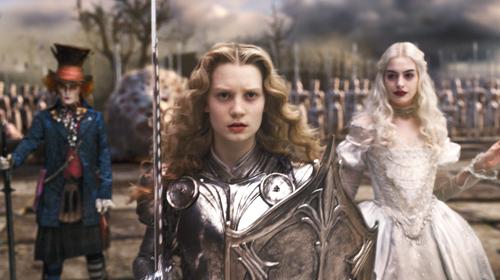Historically, navigating the film industry has been perpetually difficult for women in terms of gender equality.
Therefore, it is ironic that from almost the inception of motion pictures, women often portrayed strong, industrious protagonists. The roles portrayed in “Alice in Wonderland” and “The Last Station,” respectively, both feature 19th century heroines, both derive from the lives of legendary authors, both have extremely strong wills and both decide their societal roles.
Director Tim Burton’s (“Edward Scissorhands,” “Beetleguise”) dark perspective melds seemlessly with Walt Disney’s childlike sense of wonder in the continuation of Lewis Carroll’s Alice’s saga in “Alice in Wonderland.” In this latest imaging, 19-year-old Alice (Mia Wasikowska) falls back down the rabbit hole after running away from an inappropriate suitor’s marriage proposal. Alice comes to terms that her previous visit to Wonderland wasn’t a dream and that with the help of the Mad Hatter (Johnny Depp) and the White Queen (Anne Hathaway), she must find the courage to fulfill her destiny by defeating the Jabberwocky.
Wasikowska presents Alice as a girl on the verge of womanhood who, stifled by social norms, must choose the right path for her; damn the consequences. The fantastical confrontation in Wonderland parallels the challenges Alice faces in the “real” world. Burton draws on his vivid imagination to express this allegory of how Alice chooses her destiny in the face of opposition.
“The Last Station” follows the final days of author Leo Tolstoy (Oscar nominee Christopher Plummer) and how his fiercely loyal wife Sofya (Oscar nominee Helen Mirren) tries to protect her husband’s legacy from profiteering disciple Vladimir Chertkov (Paul Giamatti).
Though the relationship between Leo and Sofya is tumultuous (to say the least), Mirren’s performance of a woman in a staunchly male-driven society has no qualms about standing up for equanimity via the love of her husband. Director Michael Hoffman (“Restoration,” “Soapdish”) has a keen eye for the period but most importantly, knows how to stand back and allow his actors to create nuanced, complex performances.
During the 20th century, women made enormous strides in gender equality, but there is still work to be done (i.e. sameness in pay, etc.). Though the inner workings of Hollywood continually fall prey to this disparity, the storytelling in “Alice in Wonderland” and “The Last Station” allows the dreams of all women to be within sight.
Both films: A-
Ari Silber is a Loyola MBA student. Before graduate school, he worked for nine years in the Los Angeles film industry, focusing on marketing, publicity and distribution. He can be reached at [email protected]







